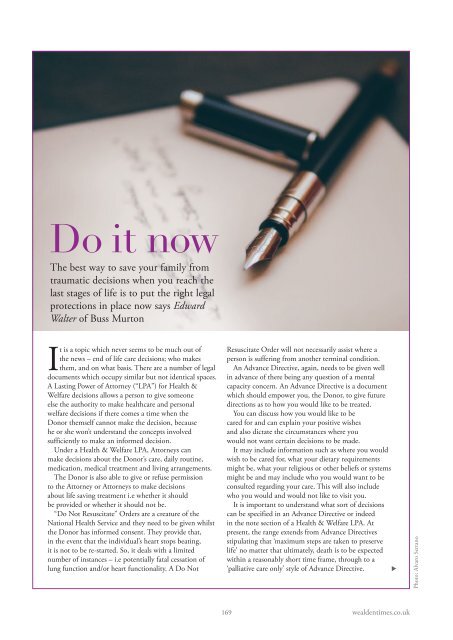Wealden Times | WT199 | September 2018 | Education supplement inside
Wealden Times - The lifestyle magazine for the Weald
Wealden Times - The lifestyle magazine for the Weald
Create successful ePaper yourself
Turn your PDF publications into a flip-book with our unique Google optimized e-Paper software.
Do it now<br />
The best way to save your family from<br />
traumatic decisions when you reach the<br />
last stages of life is to put the right legal<br />
protections in place now says Edward<br />
Walter of Buss Murton<br />
It is a topic which never seems to be much out of<br />
the news – end of life care decisions; who makes<br />
them, and on what basis. There are a number of legal<br />
documents which occupy similar but not identical spaces.<br />
A Lasting Power of Attorney (“LPA”) for Health &<br />
Welfare decisions allows a person to give someone<br />
else the authority to make healthcare and personal<br />
welfare decisions if there comes a time when the<br />
Donor themself cannot make the decision, because<br />
he or she won’t understand the concepts involved<br />
sufficiently to make an informed decision.<br />
Under a Health & Welfare LPA, Attorneys can<br />
make decisions about the Donor’s care, daily routine,<br />
medication, medical treatment and living arrangements.<br />
The Donor is also able to give or refuse permission<br />
to the Attorney or Attorneys to make decisions<br />
about life saving treatment i.e whether it should<br />
be provided or whether it should not be.<br />
“Do Not Resuscitate” Orders are a creature of the<br />
National Health Service and they need to be given whilst<br />
the Donor has informed consent. They provide that,<br />
in the event that the individual’s heart stops beating,<br />
it is not to be re-started. So, it deals with a limited<br />
number of instances – i.e potentially fatal cessation of<br />
lung function and/or heart functionality. A Do Not<br />
Resuscitate Order will not necessarily assist where a<br />
person is suffering from another terminal condition.<br />
An Advance Directive, again, needs to be given well<br />
in advance of there being any question of a mental<br />
capacity concern. An Advance Directive is a document<br />
which should empower you, the Donor, to give future<br />
directions as to how you would like to be treated.<br />
You can discuss how you would like to be<br />
cared for and can explain your positive wishes<br />
and also dictate the circumstances where you<br />
would not want certain decisions to be made.<br />
It may include information such as where you would<br />
wish to be cared for, what your dietary requirements<br />
might be, what your religious or other beliefs or systems<br />
might be and may include who you would want to be<br />
consulted regarding your care. This will also include<br />
who you would and would not like to visit you.<br />
It is important to understand what sort of decisions<br />
can be specified in an Advance Directive or indeed<br />
in the note section of a Health & Welfare LPA. At<br />
present, the range extends from Advance Directives<br />
stipulating that ‘maximum steps are taken to preserve<br />
life’ no matter that ultimately, death is to be expected<br />
within a reasonably short time frame, through to a<br />
‘palliative care only’ style of Advance Directive. <br />
Photo: Alvaro Serrano<br />
169 wealdentimes.co.uk


















